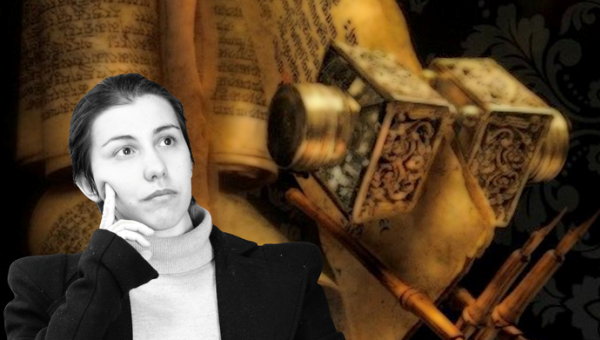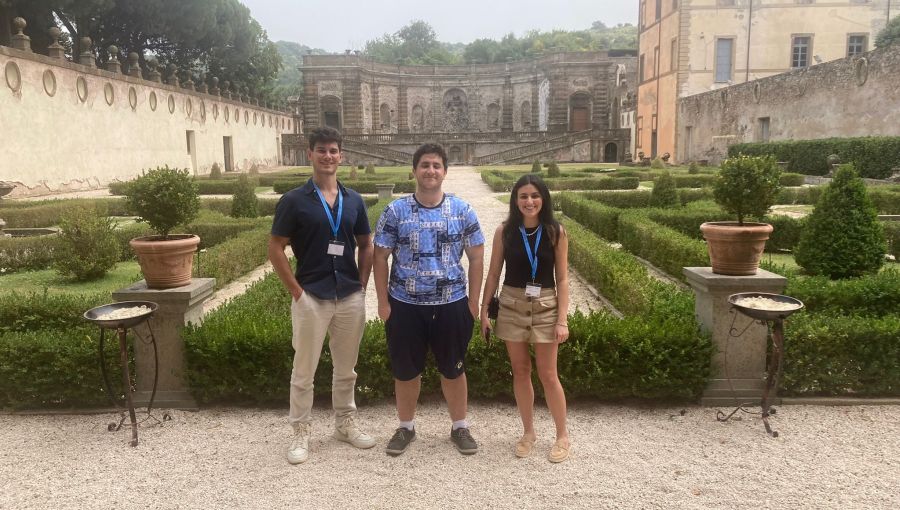Culture is the Key: Communications Graduate Jay Manari
Jay Manari is a non-binary Italian director, writer, and filmmaker who graduated from JCU in 2015 with a B.A. in Communications. In September 2021 Jay will start a part-time Ph.D. program on the “Anatomy of a Politically Incorrect Directing Method: Feminism, Transfeminism, and Beyond” at the University of Birmingham in the U.K.
What was your undergraduate experience at JCU like?
I chose JCU because it gave me the opportunity to personalize my academic journey. I have always known my goal was to work in the film and TV industry and that is why I focused on film courses, like Cinematic Rome, Introduction to Cinema, and Italian Cinema with Professor Federica Capoferri, or Advanced Film Production with Professor Brian Thomson.

Jay Manari
During my first semester, I had already downloaded the documents to apply to study abroad at the California State University at Long Beach. In Spring 2014, I submitted that application and moved to Long Beach for a direct exchange study program in Film and Electronic Arts. I was extremely excited and determined to take as much advantage as possible from my privileged experience. After that, I realized I could extend my study abroad, so I applied for the Advanced Film Production course at the New School in New York City. Throughout that academic year, I managed to find the opportunity to work on a variety of TV sets and commercials, as well as indie film productions, while producing, writing, and directing my own work. It was an incredibly fulfilling experience from both a professional and socio-political point of view. After graduating in 2015, I started working and traveling again. Rome, Paris, London, then Rome again, and finally Cardiff, Wales. While living in London, I found out that many great HTV dramas and features are actually filmed in Wales (i.e. Sex Education, The One), and after having lived in large cities, I was keen to settle down in a quieter, yet artistic city.
You are a film director, writer, filmmaker, and visual artist. How did you become interested in film and art in general?
I remember vividly that, as a child watching cartoons or reading stories, I used to imagine I could jump into the TV screen and join the characters to help them succeed in their quests and ultimately lead them towards a different ending. I told my parents, “I want to become a director because I’d like to change the ending, since sometimes in life we are not able to.” Very often, in an artistic career, the only person who believes in you… is yourself. Once you are aware of that, you are no longer afraid of failure, and, little by little, people start to look up to you. I began to write at the age of 13 and, since then, I have never stopped. I decided not to publish everything that I write, as the act of writing is mostly a form of self-psychoanalysis for me. That’s why I published and transformed into films stories I felt could work on screen.
You’ve worked both in Europe and the U.S. What are the main differences between the two continents in terms of the film industry?
To put it simply, in the U.S. the film industry is an important part of the economy. Being a performer, a filmmaker, or creative talent is very common and almost expected of you. In Europe, the approach towards the film industry is still that of an elite. I do a job that is considered “exceptional” and of which very little is known. It is a job where you need to know the password to open the secret gate to that place where you are actually allowed to perform what you do and get paid. Anywhere in the world, you can find universities and film schools, but the truth is, the majority of filmmakers are self-taught and learned what they know by doing it. In California, I met producers and executives whose degrees were in Literature and Philosophy. Not quite what you would expect, right? Yet, they were at the top of their game. Nowadays, you go to film school more for networking opportunities than for academic learning. Private universities have partnerships with multiple businesses that would be very happy to take you on board and give you a chance to work with them because your entry, in a way, has been already “paid for” with your tuition. That is not a negative thing, yet it is something I strongly believe every proactive learner should be aware of when picking their best university. The U.S. is the place where I witnessed the advanced stage of what American author and entrepreneur Andrew Keen defined as “a crisis of democratized culture.” In 2007, he wrote an alarming book, called The Cult of the Amateur: How Today’s Internet Is Killing Our Culture. I highly recommend it to any serious, young, talented, aspiring filmmaker who wants to make it in this business with eyes wide open.
Tell us about a challenge that you encountered while founding of ManarìFilmArts Productions and MiraBan Ltd. How did you overcome it?
Launching a company is always a risky business. Everything new is a challenge and patience is like an old, wise fellow you have to go on a daily walk with. How do you overcome challenges? Simple, by making mistakes. There are so many aspects of owning a company you will only learn by trial and error. One recommendation I think is essential for anyone who is thinking of cofounding a company is to not set up a business with a friend, because you think you get along quite well, but in the long run, you might regret it. Instead, set up a company with someone whose mindset, devotion, and strong will are very close to your own.
How did your studies at JCU prepare you for your career? What JCU professors and/or classes had the most impact on you?
Regardless of the major you choose, studying at JCU gives you a career-oriented mindset. I have beautiful memories of my time at JCU. The professors I miss the most are definitely Silvia Ammary and Alessandra Grego, who teach in the Department of English Language and Literature. I have always admired passionate teachers who empower you without trying to impose their views on you or on the way you write. In certain cases, the difference between “preaching” and “teaching” can be subtle, depending on the professor’s personality and attitude towards the students. In my case, I want to remember the bright side of my courses and be thankful for all the professors who enriched me with their knowledge.
What advice would you give to aspiring filmmakers?
Don’t let workplaces intimidate you. Step up confidently. Even when you get that HTV job that pays well, ask yourself why you are working there and if it fits your purpose. Sometimes in your career, there are roles you cover that may not be exactly the job you dream of, but if they fit under the “umbrella” of the environment you want to be in, then consider them worthy to achieve your long-term goals. Keep challenging yourself, and be ready to be disappointed. First of all, as a creator, if you are planning to leave a trace with your own art, working only on other people’s projects should not be your only goal. I am speaking especially to future writers and directors. Keep practicing. Do not only watch movies. Read the classics, listen to audiobooks, go to live concerts, operas, plays, and if you cannot access them now, don’t forget they are also available on streaming platforms. Push yourself to be greater than you are. Educate yourself. Don’t be afraid of loneliness. Enjoy the time you spend with yourself and one day you will share the greatest stories you have locked somewhere inside you.
What are three films/directors that everyone should know and why?
I would highly recommend not sticking to the classics only. Or the big blockbusters. Watch them, then move on. Every movie and every director have a certain kind of audience and maybe their films are very far from the ones you want to go for. And that is perfectly fine! Break free from the big names and explore more. Watch contemporary emerging filmmakers, go to indie film festivals, search for the unheard voices. Search for movies made by cisgender female directors, transexual and asexual directors, people of color, or with disabilities. Their films have so much to give you. Céline Sciamma, Greta Gerwig Léa Pool are just a few names that come to my mind now. They are not in any particular order as I hate hierarchy, especially when it comes to art.
What are your plans for the future?
I am currently working on the feature film funding of Feelings in the Shadow, a period drama/romance, based on my Italian short novel Il Senso di un’ombra. Moreover, I am completing a new novel that I aim to finish by the end of summer. In September 2021, I am going to start a part-time Ph.D. on the “Anatomy of a Politically Incorrect Directing Method: Feminism, Transfeminism, and Beyond” at the University of Birmingham. All of this while working on the HTV drama War of the Worlds 3 and Sex Education 4 next year. I respect academic endeavors, and most of all I believe in directors and writers who take their roles intellectually. That is the kind of director and writer I am, and the one I want to continue to be. There is a very high risk of becoming mere technicians when working in the film industry. I have met very skilled filmmakers who knew everything about cameras and lighting and nothing about metaphors and figurative language. That is one of the reasons I am dedicated to lifelong learning. If you devote yourself to the arts, then you should think like an artist: culture is the key.





